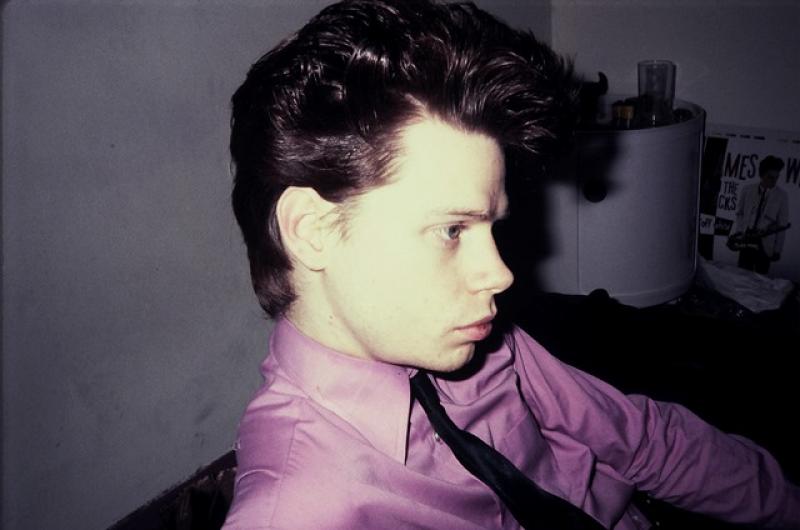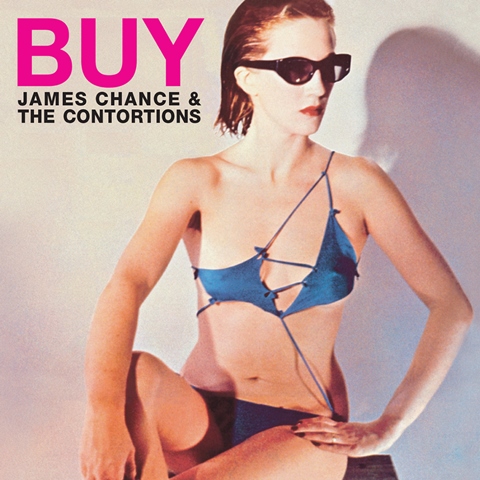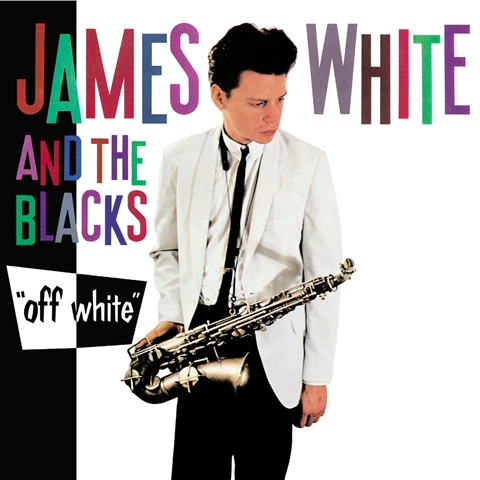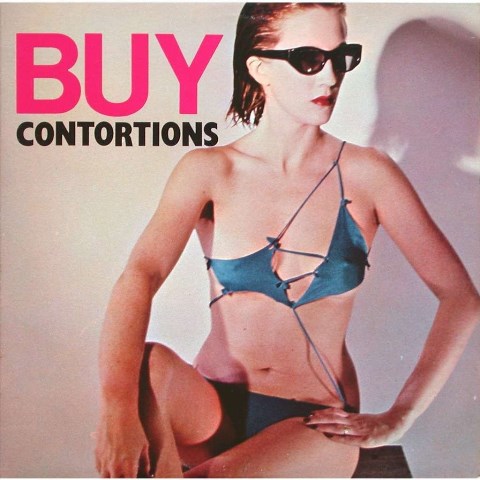Reissue CDs Weekly: James Chance aka James White | reviews, news & interviews
Reissue CDs Weekly: James Chance aka James White
Reissue CDs Weekly: James Chance aka James White
Musical cubism on the first two albums from the confrontational New York no wave pioneer

According to the May 1979 issue of the New York art-paper East Village Eye, James White “is treated [everywhere] with awe and the special consideration lacking in most people's lives.” The adoration was boundless. White is “the star, the proof of the divinity that can be had by those who strive for a life beyond the schemes of men, James White is not an animal creature, James White is one of the breed called God in older times.”
For those who hadn’t realised White was a deity, his more commonly known alter-ego James Chance remained a mere cornerstone of the New York-spawned no wave scene celebrated on the Eno-produced 1978 compilation album No New York. Within its grooves, Chance and his splenetic band Contortions battled for attention alongside the equally fractious D.N.A., Mars and Teenage Jesus and the Jerks. He was also a member of the latter.
 Getting a handle on Chance aka White was not meant to be easy. Of course, he was not a God. Instead, he was the Milwaukee-born James Siegfried, a conservatory-educated musician who moved to New York City in 1975. Adept on keyboards and sax, he had a head full of jazz and found his place in an arty scene where envelope-pushing was rife. The musical straightjacket of punk was mostly side-stepped in New York, yet the newly renamed Chance drew on the confrontational aspects of the era and was wont to start fights with his audience.
Getting a handle on Chance aka White was not meant to be easy. Of course, he was not a God. Instead, he was the Milwaukee-born James Siegfried, a conservatory-educated musician who moved to New York City in 1975. Adept on keyboards and sax, he had a head full of jazz and found his place in an arty scene where envelope-pushing was rife. The musical straightjacket of punk was mostly side-stepped in New York, yet the newly renamed Chance drew on the confrontational aspects of the era and was wont to start fights with his audience.
Buy – credited to Contortions – and Off White – credited to James White and the Blacks – were the first two albums Chance made, both issued in 1979 and recorded by pretty much the same band. Each was issued on ZE, the label set up by Michael Zilkha and Michel Esteban. Chance assumed the further identity for Off White as it was distinct project: Esteban had asked him to make a disco album.
 The reappearance of both brings the opportunity to, indeed, assess whether this is the music of a God. Hardly. Despite the East Village Eye’s idiotic hubris, there is a devotional aspect to each album. As well as jazz, Chance was infatuated with James Brown (hence the name James White). Furthermore, he worked himself into such frenzy on stage he may as well have been in a ritual trance.
The reappearance of both brings the opportunity to, indeed, assess whether this is the music of a God. Hardly. Despite the East Village Eye’s idiotic hubris, there is a devotional aspect to each album. As well as jazz, Chance was infatuated with James Brown (hence the name James White). Furthermore, he worked himself into such frenzy on stage he may as well have been in a ritual trance.
Buy is the album to hear first. It is music as cubism, wildly refracting funk, jazz and soul with cheese-grater guitar, rubbery bass, squawking sax and relentless rhythms. Every cut is a classic and the album defines unhinged despite being entirely deliberate. Off White is less immediately impactful as Chance had produced it to order. Although he had no instructions beyond conceptually addressing disco, it is more scattershot and less direct. Even so, it remains bizarre, energised and – at a stretch – could have been the album Albert Ayler made if he was tasked with trying disco on for size. Both albums are a blast.
 While the music itself remains timeless, this pair of new releases says nothing new. Each repackages CD versions of the albums issued in 2004, reusing the bonus tracks and Michel Esteban’s liner notes from then. Frustratingly, the same liner notes are employed for each package. Furthermore, this is an overview rather than text dedicated to each album and its context. Two new essays should have been written. Also, the digital remasters from 2004 are recycled: these are very dry and lack the mid-range punch of the original vinyl albums. A glitch at the end Buy’s “My Infatuation” interrupts the track moments before it has run its course. Buy comes with a cover crediting the album to James Chance & The Contortions: this is an after-the-fact confabulation. It was originally credited solely to Contortions, which is what the band were called, and the album should be seen as thus otherwise history is rewritten. To play spot the difference, the original sleeve is seen to the right while the new reissue version appears above. It would have good if both albums had been revisited wholesale before hitting the market again.
While the music itself remains timeless, this pair of new releases says nothing new. Each repackages CD versions of the albums issued in 2004, reusing the bonus tracks and Michel Esteban’s liner notes from then. Frustratingly, the same liner notes are employed for each package. Furthermore, this is an overview rather than text dedicated to each album and its context. Two new essays should have been written. Also, the digital remasters from 2004 are recycled: these are very dry and lack the mid-range punch of the original vinyl albums. A glitch at the end Buy’s “My Infatuation” interrupts the track moments before it has run its course. Buy comes with a cover crediting the album to James Chance & The Contortions: this is an after-the-fact confabulation. It was originally credited solely to Contortions, which is what the band were called, and the album should be seen as thus otherwise history is rewritten. To play spot the difference, the original sleeve is seen to the right while the new reissue version appears above. It would have good if both albums had been revisited wholesale before hitting the market again.
Nonetheless, Buy and Off White are fantastic and the fresh availability should be an invitation to check out the true one-off that is James Chance. For anyone who wants to dig in to what was originally intended, neither album is rare and originals of Off White fetch around £10. Buy hits £20. The choice is there to be made.
Share this article
The future of Arts Journalism
You can stop theartsdesk.com closing!
We urgently need financing to survive. Our fundraising drive has thus far raised £49,000 but we need to reach £100,000 or we will be forced to close. Please contribute here: https://gofund.me/c3f6033d
And if you can forward this information to anyone who might assist, we’d be grateful.

Subscribe to theartsdesk.com
Thank you for continuing to read our work on theartsdesk.com. For unlimited access to every article in its entirety, including our archive of more than 15,000 pieces, we're asking for £5 per month or £40 per year. We feel it's a very good deal, and hope you do too.
To take a subscription now simply click here.
And if you're looking for that extra gift for a friend or family member, why not treat them to a theartsdesk.com gift subscription?
more New music
 Music Reissues Weekly: The Beatles - What's The New, Mary Jane
John Lennon’s queasy, see-sawing oddity becomes the subject of a whole album
Music Reissues Weekly: The Beatles - What's The New, Mary Jane
John Lennon’s queasy, see-sawing oddity becomes the subject of a whole album
 The Maccabees, Barrowland, Glasgow review - indie band return with both emotion and quality
The five-piece's reunion showed their music has stood the test of time.
The Maccabees, Barrowland, Glasgow review - indie band return with both emotion and quality
The five-piece's reunion showed their music has stood the test of time.
 Album: Blood Orange - Essex Honey
A triumph for the artist who doesn't clamour for attention but just keeps growing
Album: Blood Orange - Essex Honey
A triumph for the artist who doesn't clamour for attention but just keeps growing
 Houghton / We Out Here festivals review - an ultra-marathon of community vibes
Two different but overlapping flavours of subculture full of vigour
Houghton / We Out Here festivals review - an ultra-marathon of community vibes
Two different but overlapping flavours of subculture full of vigour
 Album: Wolf Alice - Clearing
Ten years from their debut, Wolf Alice once again make magic from the familiar
Album: Wolf Alice - Clearing
Ten years from their debut, Wolf Alice once again make magic from the familiar
 Album: Deftones - Private Music
Deftones give us a glimmer of hope, but that's all...
Album: Deftones - Private Music
Deftones give us a glimmer of hope, but that's all...
 Album: Eve Adams - American Dust
Taking inspiration from the Californian desert
Album: Eve Adams - American Dust
Taking inspiration from the Californian desert
 Gibby Haynes, O2 Academy 2, Birmingham review - ex-Butthole Surfer goes School of Rock
Butthole Surfers’ frontman is still flying his freak flag but in a slightly more restrained manner
Gibby Haynes, O2 Academy 2, Birmingham review - ex-Butthole Surfer goes School of Rock
Butthole Surfers’ frontman is still flying his freak flag but in a slightly more restrained manner
 Album: Adrian Sherwood - The Collapse of Everything
The dub maestro stretches out and chills
Album: Adrian Sherwood - The Collapse of Everything
The dub maestro stretches out and chills
 Music Reissues Weekly: The Residents - American Composer's Series
James Brown, George Gershwin, John Philip Sousa and Hank Williams as seen through an eyeball-headed lens
Music Reissues Weekly: The Residents - American Composer's Series
James Brown, George Gershwin, John Philip Sousa and Hank Williams as seen through an eyeball-headed lens
 Album: Dinosaur Pile-Up - I've Felt Better
Heavy rock power pop trio return after an unwanted lengthy break
Album: Dinosaur Pile-Up - I've Felt Better
Heavy rock power pop trio return after an unwanted lengthy break
 Album: Tom Grennan - Everywhere I Went Led Me To Where I Didn't Want To Be
British pop star's fourth exhibits ultra-pop oomph with mixed results
Album: Tom Grennan - Everywhere I Went Led Me To Where I Didn't Want To Be
British pop star's fourth exhibits ultra-pop oomph with mixed results

Add comment